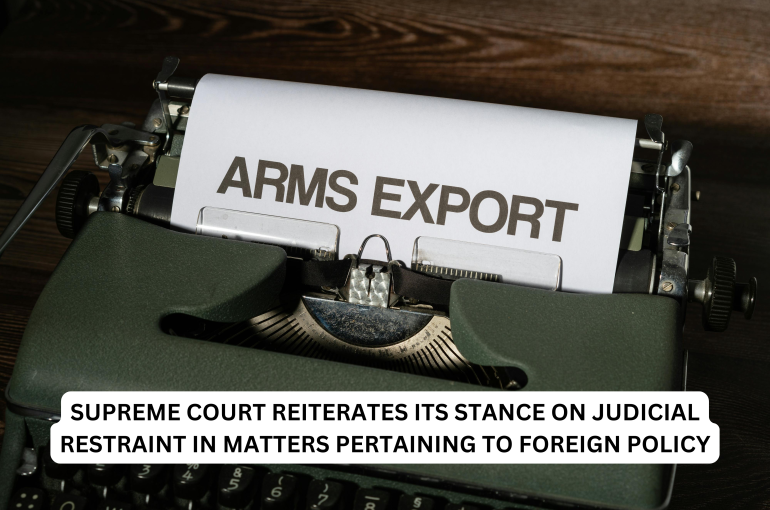SUPREME COURT REITERATES ITS STANCE ON JUDICIAL RESTRAINT IN MATTERS PERTAINING TO FOREIGN POLICY
Introduction
The Hon’ble Supreme Court of India vide Order dated 09-09-2024, delivered a judgment in the case of Ashok Kumar Sharma & Ors vs Union of India [WRIT PETITION (CIVIL) NO. 551 OF 2024], wherein the Petition was filed under Article 32 of the Constitution of India, seeking judicial intervention to cancel existing licenses and prevent the issuance of new licenses for the export of arms and military equipment to Israel. The Petitioners raised concerns about India’s international obligations amidst the ongoing conflict between Israel and Gaza.
Case Background
The present Petition was brought forth by a group of former civil servants, scholars, human rights activists, and experts in fields like International Relations and Policy Analysis. Their primary contention was that the Indian Government’s decision to issue licenses for arms’ exports to Israel, violated both International Law and the fundamental rights enshrined in the Indian Constitution, particularly Article 14 (Equality before law), Article 21 (Protection of life and personal liberty), and Article 51(c) (Promotion of International Peace and Security).
The Petition specifically pointed to India’s obligations under International Law, referencing Treaties and Rulings of the International Court of Justice (ICJ), which allegedly recognized Israel’s involvement in war crimes and genocide in Palestinian territories. As a result, the Petitioners sought a judicial order to halt any further arms deals with Israel.
Legal Grounds of the Petition
Petitioners’ Arguments:
The Petitioners argued that India’s continued arms’ exports to Israel constituted a violation of International Treaties, particularly those aimed at preventing the export of military equipment to States involved in war crimes or genocide. The Convention on the Prevention and Punishment of the Crime of Genocide 1948 (Genocide Convention) was specifically cited to support their claims.
The Petitioners alleged that the licenses violated Article 14 and Article 21 of the Constitution, which guarantee fundamental rights to persons. They also referred to Article 51(c), which emphasizes India’s commitment to International Peace and Security.
In support of their argument, the Petitioners’ Counsel, Mr. Prashant Bhushan, referenced ICJ rulings and International Treaties prohibiting military support to States engaged in human rights violations.
Union Government’s Stand:
The Government argued that under Article 73 of the Indian Constitution, the power to manage foreign affairs lies exclusively with the Union Government. Furthermore, Article 253 provides Parliament the authority to enact laws related to international treaties and agreements. As such, the Judiciary does not have jurisdiction to interfere in matters of foreign policy.
The Government highlighted that many of the licenses in question were linked to contracts with international entities, including companies in Israel. Cancelling these licenses would not only violate International Agreements but also expose Indian companies to damages and reputational harm, thereby, affecting India’s broader geopolitical and economic interests.
It was emphasized that Israel, as a sovereign nation, could not be made subject to Indian judicial orders regarding its conduct in the Gaza conflict. This limitation of jurisdiction was central to the Government’s defense.
Judgment
The Supreme Court, in its ruling, dismissed the Petition and refused to grant the requested reliefs.
The Hon’ble Court reaffirmed that matters related to foreign policy and international relations fall within the exclusive domain of the Union Government. Article 73 clearly vests the executive with the authority to manage foreign affairs, and the Judiciary should exercise restraint in interfering with these functions. The Court expressed that the subject matter of the Petition required an executive, rather than a judicial, solution.
The Hon’ble Court recognized Israel as an independent sovereign nation. It underscored that any relief granted in this case would require findings regarding Israel’s conduct in Gaza, an area beyond the jurisdiction of Indian Courts. It would be inappropriate for the Court to adjudicate on matters involving the actions of a foreign State.
The Hon’ble Court noted that many of the licenses for arms’ exports were part of International Contracts between Indian companies and foreign entities, including Israeli companies. Judicial intervention could lead to breaches of these Contracts, resulting in significant financial and reputational consequences for Indian companies. The Hon’ble Court determined that assessing the fallout of such breaches was beyond its scope.
The Hon’ble Court highlighted that the Union Government possesses adequate statutory powers under domestic laws, such as the Foreign Trade (Regulation and Development) Act 1992 and the Customs Act, 1962 to impose any prohibitions on arms’ exports, should it deem such action necessary. The Bench emphasised that decisions related to international trade and geopolitical considerations must be left to the Government, which can weigh the economic, political, and diplomatic implications.
The judgment emphasized the Principle of Self-Imposed Restraint by the Judiciary when it comes to foreign policy. The Hon’ble Court was cautious not to intrude into areas reserved for the Executive Branch, especially when the potential consequences of its actions, on international relations, were uncertain.
Conclusion
The Supreme Court’s dismissal of the Petition reaffirms the limited role of the Judiciary in matters related to foreign policy and international relations. The Hon’ble Court’s decision highlights the Doctrine of Separation of Powers that is a basic structure of the Indian Constitution.
ASHITA
ASSOCIATE
THE INDIAN LAWYER & ALLIED SERVICES





































Leave a Reply